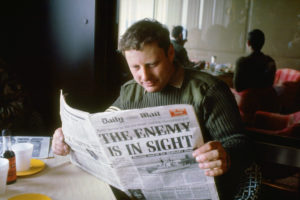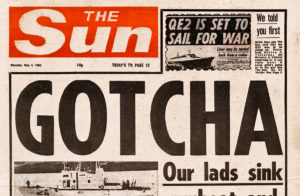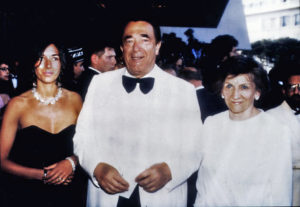“I’m calling to celebrate the demise of Maxwell,” said Rupert Murdoch down the phone to me on the morning Robert Maxwell’s private effects were being auctioned in a bankruptcy sale. I acknowledged that Maxwell had been a frightful scoundrel, but that he was an unforgettable character and I didn’t like to think of him floating around dead in the Bay of Biscay. “I do,” was the reply. Murdoch, as I was often reminded over many years, was a fierce competitor.
Rupert Murdoch, who has retired after 69 years at the head of News Corporation, is indisputably the foremost and boldest media proprietor in history. Lord Northcliffe and William Randolph Hearst would have been contenders for that title in earlier times, but Northcliffe died before the radio, film, and television industries were seriously established, and while Hearst was to some extent a multi-media owner, he was a pioneer only in some aspects of the newspaper business. Both men confined themselves to their native countries. Hearst is better remembered as a fantastic, almost Oriental art collector, builder of the most magnificent residence in the new world, and fabled star of public curiosity, especially as the inspiration for Citizen Kane. Northcliffe, to the extent he is still remembered, (he died nearly a century ago), is chiefly recalled for the madness of his last years; a few months before he died, he phoned the editor of The Times, which he owned, shouted “Are you a shrimp or a brewer?” and hung up without waiting for an answer. Such eccentricities have never been ascribed to Rupert Murdoch.
His father, Sir Keith Murdoch, was a journalist and publisher most famous for his claims that Gallipoli was a bungled British operation in which Australians were sacrificed as cannon-fodder. He died in 1952, and Rupert, then a recent graduate of Oxford, where he was a strenuous supporter of the Labour Party, took over his father’s modest provincial Australian newspaper, The Adelaide News. He raised its profitability, made a number of acquisitions, and followed the path trodden by other Commonwealth figures, particularly Lord Beaverbrook and Lord Thomson, to Fleet Street. Not without controversy, he gained control of the mass circulation Sunday tabloid News of the World and then The Sun, which he converted to a tabloid, in 1969. He quickly demonstrated the flair he had developed in Australia for presenting witty, provocative, and sensational news for a popular readership.
The Sun, a derelict broadsheet, had been offered for sale for a nominal amount by the Mirror Group to spare itself the cost of redundancy payments in shutting it down. This decision by Mirror CEO Hugh Cudlipp was one of the most catastrophic misjudgments in the history of the British newspaper industry. On seeing the first copy of The Sun under new ownership, Cudlipp confidently stated that The Mirror had nothing to fear. Murdoch produced a much more flamboyant tabloid morning national newspaper with a populist, low tax and somewhat libertarian flavour that resonated more strongly than the socialistic class antagonism of The Mirror.
The Sun eclipsed The Mirror in circulation in nine years, reaching and for a long time remaining at about five million daily — the Western world’s largest daily newspaper circulation. It was a renowned source of humorous headlines and stories; page 3 featured a sexy naked or scantily clad young woman. In advising against voting for the Labour Party in 1992, The Sun warned that, if it were elected, for the next four years “the page 3 girl will look like this”: an under-dressed woman of approximately 300 pounds on a bicycle. When a summer strike in the French ports for the cross-Channel ferries effectively stopped traffic to France other than by air, The Sun headline was: “BLOODY FROGS SCUTTLE OUR HOLS.” During the Falklands War, Private Eye spoofed that The Sun was offering a mini-metro automobile to any British soldier who “killed an Argie”. It did not seem implausible.
Murdoch became the tabloid king of the English-speaking world after buying the New York Post in 1975, America’s oldest daily newspaper, which he has gradually built up to be the leading and liveliest American tabloid newspaper. He bought the money-losing Times and the profitable Sunday Times from Thomson in 1981, after The Times had taken and lost a prolonged strike. One of his greatest and boldest initiatives was building a state-of-the-art printing facility at Wapping. It remained unoccupied for months as he tried to negotiate demanning arrangements with the printing and pre-press unions. The unions took no notice of the less tolerant regime for illegal work stoppages that the Thatcher government imposed, and when the unionised workforce struck, illegally, but as had been their custom, Murdoch fired them and replaced them at once with a smaller, carefully assembled workforce.
Despite prolonged and violent demonstrations, these workers were successfully brought in and out of the new plant in armoured buses and under heavy police protection until a severance settlement was reached. This was a glorious victory over the notoriously capricious Fleet Street shop stewards who for decades had delighted in taking newspapers down for frivolous reasons, insisting on hugely inflated numbers of employees and cash payments to phantom workers. He revolutionised the London newspaper industry and all of the other publishers followed him to new printing facilities and higher profits, (though I was the only one who publicly recognised our debt to him — I had bought control of the Telegraph Group in 1986).
His next pioneering initiative was buying up independent television stations in the United States, putting them together as a network, and buying the Twentieth Century Fox film studio and engaging in systematic integration by doing much of his own programming. At approximately the same time, he set up a relatively unregulated satellite telecaster in Britain and, after a good deal of skirmishing, merged with his chief competitor and became the controlling shareholder of British Sky Broadcasting, which after heavy start-up costs, became another enormous profit centre. Here again he was a pioneer and was one of the world’s greatest satellite television operators.
He outlined to television veteran Roger Ailes his idea of a conservative American cable news network, to compete with the relentlessly leftist CNN and MSNBC, both owned by huge media conglomerates. In one of the most famous exchanges of modern media industry history, Ailes said that this could work; Murdoch asked how much it would cost and when the response came, “$800 million”, Murdoch replied: “What are you waiting for?”
Fox News was an overwhelming success from the start and has vastly outperformed its chief rivals. He has also persisted in the newspaper business and has been instrumental in developing digital subscriptions as a formula for rebuilding newspaper circulation. In 2007, he bought Dow Jones, publisher of the Wall Street Journal, and has transformed it into a general interest newspaper that has severely challenged and somewhat displaced The New York Times as the country’s most influential newspaper.
Not everything has been a success. In unleashing cover price wars in the British national newspaper market in the Nineties, he damaged the economics of that industry without significantly improving his position in the quality newspaper market. Turning the Times into a tabloid is hard to justify. He lost over $500 million on the Internet site Myspace, and was probably taken for more than $2 billion on TV Guide by the venerable Walter Annenberg. He built his company on debt and had a severe financial crisis in the late Eighties. He has since sold most of his assets except for the newspapers and Fox News and the book publisher Harper Collins and now has a fairly conservative balance sheet, despite the recent loss of an astounding $787 million defamation action over the 2020 US election.
For a long time, most of his editors and close collaborators seemed to leave his employ involuntarily and often, as with Harry Evans (Times) and Andrew Neil (Sunday Times and Sky), acrimoniously. In the end, after receiving many favours from her, he deserted Margaret Thatcher, and except for Ronald Reagan, most other political leaders in all the countries where he has been active.
Having known him intermittently for over 40 years, and competed with him in Britain and Australia, I’ve never had the impression that he is much interested in politics, other than in how they affect him, or culture, or hobbies, except perhaps motor-sailing. His company is his passion, occupation, and pastime. Although he has known an enormous number of prominent people, he is not socially ambitious, declined a seat in the House of Lords, and though well-educated, knowledgeable and always astute and perceptive, he never tries to impress anyone and is not prepossessing. He has a laconic sense of humour.
I have always thought him a cynic, and while he was not directly implicated in the hacking scandal over a decade ago in England, he is responsible for the News Corp culture of entitlement to do almost anything in pursuit of the corporate interest. A culture of total war and take no prisoners. But when I told him that I thought the animated Fox Television series, The Simpsons in which the family is a caricature of proletarian philistinism and the politician in the series is corrupt, was representative of his views, he strenuously denied it.
He is affable and courteous but not gregarious, and never pretentious or verbose; one of the few thoroughly ruthless and unsentimental people I have known. But he is a straight-forward businessman whose word is reliable. All four of his marriages have ended in divorce, but without serious indiscretions and no one knows what goes on in another person’s marriage and family. He is in excellent health and continues as the controlling shareholder of his companies. This is no time for anything remotely like an obituary.
Disclaimer
Some of the posts we share are controversial and we do not necessarily agree with them in the whole extend. Sometimes we agree with the content or part of it but we do not agree with the narration or language. Nevertheless we find them somehow interesting, valuable and/or informative or we share them, because we strongly believe in freedom of speech, free press and journalism. We strongly encourage you to have a critical approach to all the content, do your own research and analysis to build your own opinion.
We would be glad to have your feedback.
Source: UnHerd Read the original article here: https://unherd.com/




